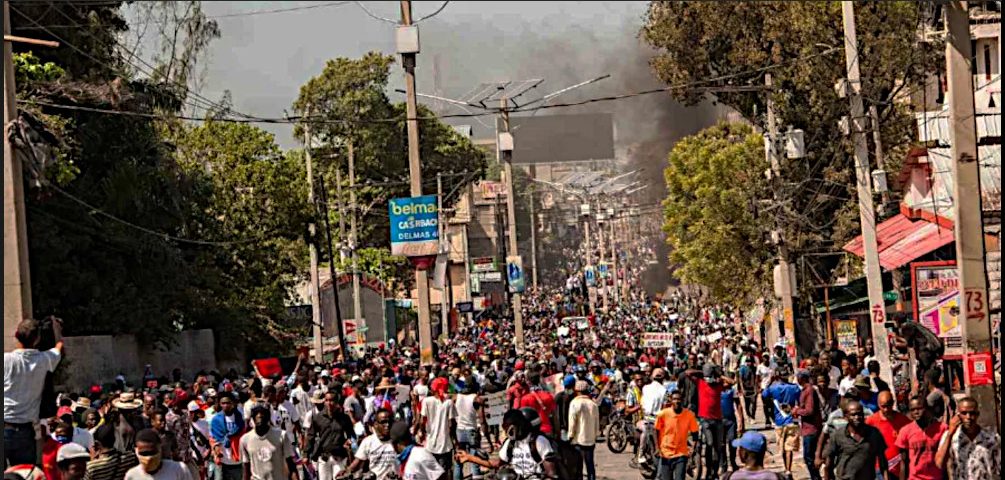By Yves Engler, published on Socialist Action, April 5, 2021
Qui Bono in Haiti? [jb]
Domination by multinational corporations and “light skinned” local capitalists — that’s the story of Haiti as illustrated by one recent event.
The day after his already paper-thin constitutional legitimacy completely eroded Jovenel Moïse gave significant amounts of Haitian land to a light-skinned oligarch working with Coca-Cola.
According to most Haitian constitutional authorities and institutions, Moïse’s presidential mandate ended Sunday, February 7, 2021. But the next day the official Le Moniteur published a presidential decree gifting 8,600 hectares of the country’s agricultural land reserve to produce stevia. Alongside land in the Artibonite and Plateau Central, Moise put up US$18 million for a new Free Agro-Industrial Export Zone run by the Apaid family. It’s outrageous, notes Le Regroupement des Haïtiens de Montréal contre l’occupation d’Haïti, that the state would offer land to a firm producing for Coca Cola rather than invest in local food production in a country where hunger is widespread.
Whether or not the officially named “Zone Franche Agro Industrielle d’Exportation de Savane Diane” moves forward, the decree is a stark example of “racial capitalism” in Haiti and why Washington and Ottawa are keeping Moïse in place. Unlike most Haitians, the Apaid family are not descendants of enslaved Africans. Born in the US, Andre Apaid Jr. is a sweat shop owner of Lebanese background.
Apaid led the Group of 184 “civil society” opposition to Jean Bertrand Aristide’s government. He reportedly financed the paramilitary forces led by Guy Philippe whose attacks created the pretext for US, French and Canadian forces to oust Aristide in 2004. (Days after Philippe told a local radio station in 2007 that Apaid funded his forces the US Drug Enforcement Agency raided Philippe’s home in the south coast city of Les Cayes.)
At the time of the coup Apaid also financed and armed a gang in the impoverished community of Cité-Soleil led by Thomas “Labanye” Robinson “to kill Lavalas supporters”. US lawyer Thomas Griffin interviewed Cité Soleil leaders and police officers who said Apaid “bought” Labanyè with US$30,000. He also reportedly enabled Labanyè’s wife to travel to the US and “keeps police from arresting the gang leader.” Various professionals and businesspeople told Griffin that Apaid was “the real government in Haiti.”
During the 1991-1994 coup against Aristide Apaid Jr.’s father, André Apaid Sr., was “one of the chief lobbyists in the U.S.” for the military junta. Previously Apaid Sr. was “close to dictator ‘Baby Doc’ Duvalier.”
During the regime of Jean-Claude Duvalier Apaid Sr. founded Alpha Sewing. With Haiti’s population cowed and economic prospects in the countryside dire, ‘Baby Doc’ developed a relatively thriving low-wage assembly sector in the 1970s. Alpha Sewing eventually became the biggest sweat-shop operator in Haiti. The firm was, of course, hostile to any effort to increase the minimum wage.
One of the richest men in Haiti, Apaid Jr. is a leader among the community of Middle Eastern descent who dominate the economy. Gilbert Bigio, Sherif Kedar Abdallah, Reginald Boulos, Dimitri Craan and Reynold Deeb Saïeh are some of the businesspeople of Middle Eastern ancestry who generally work with North American and Dominican sweatshop, mining and other capitalists with even paler complexions. Apaid, for instance, was the prime Haitian subcontractor for Montreal based T-shirt maker Gildan Activewear, which has a major presence in Haiti. In April 2009 US Secretary of State Hillary Clinton visited an Apaid factory to tout its partnership with Gildan as an important model for Haitian economic development (Apaid was invited to a Canadian government conference on Haiti in Montréal attended by PM Paul Martin a few years earlier).
Washington has been important to the descendants of Middle Easterners who dominate Haiti’s economy. Partly to supplant European influence, Washington facilitated Arab migration to Haiti in the late 1800s. At the start of the twentieth century 60 percent of imported goods sold to the Haitian peasantry came from US manufacturers who supplied Syrian middlemen. When violence targeted the Syrian community US authorities advocated on their behalf.
One element driving the US-Arab migrant relationship in Haiti was that until the US rewrote Haiti’s Constitution in 1918 foreigners were restricted from owning land. This prompted some European businessmen, particularly Germans, to marry into prominent mixed-race families to be able to own property. But US capitalists were at a disadvantage compared to their European counterparts. US race politics deemed someone Black if they had ‘one drop’ of African blood. So even marrying an educated, upper class, mixed-race Haitian woman was considered unacceptable by most White US capitalists. US interests bypassed this dynamic working with migrants from the Middle East. And this legacy of racism still explains much of what happens in Haiti today.
Jovenel Moïse needs to go. So does the “racial capitalist” system of light-skinned local oligarchs working with foreign powers that supports Moïse.
*Featured Image: People stage a demonstration demanding that President Jovenel Moise to give his resignation in Port-Au-Prince, Haiti, on February 14, 2021. (Sabin Johnson / Anadolu Agency via Getty Images)
Yves Engler is a Montreal-based writer and political activist. In addition to eleven published books, Engler’s writings have appeared in the alternative press and in mainstream publications.
